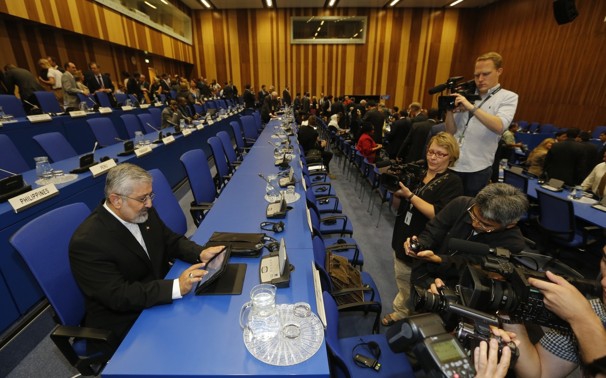Tuesday 9 October 2012 - 15:25
Story Code : 7217
With sabotage charge, Iran takes hostile tone with U.N. watchdog
VIENNA Iran is ratcheting up pressure on the U.N. agency responsible for overseeing the countrys nuclear program, accusing its inspectors of engaging in spying and sabotage and threatening to restrict U.N. access to Iranian nuclear facilities.
So strident has been Irans criticism of the International Atomic Energy Agency in recent weeks that some Western officials fear that the country is preparing to officially downgrade its cooperation with the nuclear watchdog. The Vienna-based agency is the only international body allowed to routinely visit Irans most sensitive nuclear installations.
The IAEAs notoriously troubled relations with the Islamic Republic deteriorated sharply last month after Iran reported attacks by alleged saboteurs on electrical grids serving its two uranium-enrichment plants. Since then, Iranian officials have alleged the agency was directly involved in the attacks, accusations leveled in private meetings as well as in public statements, according to Western diplomats and government officials briefed on the exchanges.
IAEA officials initially rejected the allegations as absurd. Since then, the agencys internal assessments have been unable to confirm that the attacks occurred at all, according to two European diplomats privy to the internal review.
Irans nuclear facilities are known to have been targeted by saboteurs in the past, notably in a series of covert cyberattacks attributed to the United States and Israel. But the lack of supporting evidence for any IAEA involvement in recent sabotage has underscored concerns that Iran is seeking a pretext for curtailing cooperation with U.N. inspectors, the diplomats said.
The diplomats and other Western officiacls also note that IAEA delegations visiting Iran in recent weeks have been subjected to unusual intimidation. Since mid-August, U.N. teams have been the targets of anti-IAEA protests in the capital, and inspectors have been privately warned that they could be held responsible for any future attacks on Iranian nuclear facilities by saboteurs or foreign governments, the officials and diplomats said.
The message from Iran was: If we have to reduce cooperation with you, the IAEA itself will be to blame. And if we get attacked, the IAEA and its leaders will be responsible,? said one European diplomat who was briefed on the encounters. He spoke on the condition of anonymity in discussing the IAEAs internal assessments of the events.
The diplomat described a climate of intimidation inside Iran that could, if it continues, erode the agencys ability to monitor Irans nuclear program. The IAEA, which inspects nuclear installations around the world to guard against the secret diversion of nuclear technology for military purposes, declined to comment for this article.
Irans representative to the IAEA also declined an interview request.
The heightened tensions come at a time when Irans government faces unprecedented pressure at home and abroad, including economic upheavals and threats of a military strike by Israel on the countrys nuclear facilities. Protests erupted in Tehran last week after the countrys currency, the rial, shed 40 percent of its value, driving up prices for basic commodities.
The Iran Project is not responsible for the content of quoted articles.
# Tags











